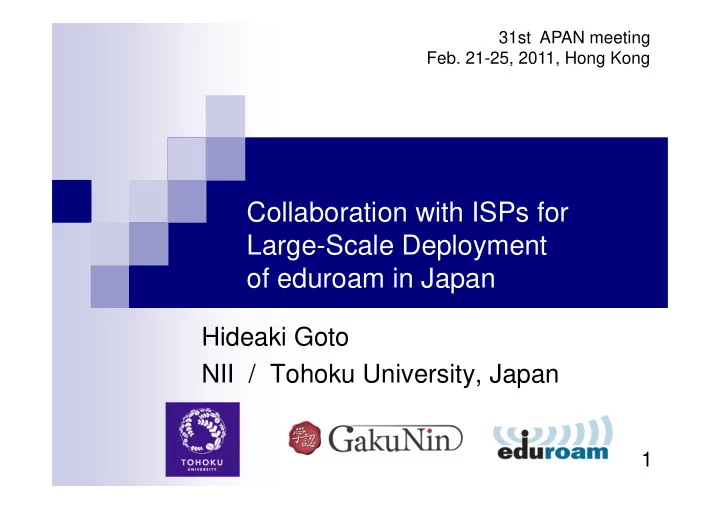

31st APAN meeting Feb. 21-25, 2011, Hong Kong Collaboration with ISPs for Large-Scale Deployment of eduroam in Japan Hideaki Goto NII / Tohoku University, Japan 1
eduroam JP National eduroam operation and promotion 19 institutions (1.6% of 1,200) joined (Feb. 2011) Tutorial & technical documents R&D Easy deployment and operation Easy configurations Location privacy, etc. Collaboration with commercial W-ISPs eduroam on commercial hotspots Shared hotspots on campus New architecture and business models for next- generation commercial / academic WLAN services 2
Problems Difficulties in large-scale RADIUS deployment Laborious eduroam connection / management work Our solutions Federated Delegate Authentication System (DEAS) with centralized/clustered RADIUS server remove RADIUS IdP at each institution Federation using Shibboleth SSO simplify RADIUS tree (higher stability) Web-based eduroam IdP / SP management system simplify connection and administration at both the eduroam JP office and each institution eduroam / ISP collaboration 3
Easy-to-join eduroam system 2. eduroam IdP/SP management web Institution’s RADIUS server national < secret key 1 > top-level access points RADIUS auth requests proxy < secret key 2 > RADIUS IdP 1. Delegate Authentication System (DEAS) 4
Federated Delegate Authentication System Account Issuer as a Shibboleth SP of Japan’s GakuNin federation (f.k.a. UPKI federation) Centralized / Clustered eduroam IdP to simplify the RADIUS proxy tree 3 types depending on the needs and federation level Pseudo-anonymized, fixed-term, and traceable roaming IDs Just sign-up to join eduroam ! 5
Current status Deployment Users Type I National DEAS deployed 5 universities (no federation, web UI only) Type II Under development – (admin-only fed.) Type III National Shib. SP for (22 federated institutions) (full fed.) GakuNin deployed (as of Feb. 2011) Univ. A, B : clients of Livedoor (ISP), using for main IdP Univ. C : using for university’s sub IdP Univ. D, E : trial use of eduroam 6
eduroam / ISP collaboration Livedoor, an ISP in Japan, provides eduroam service on their commercial hotspots 130+ in-door APs at cafes, conference sites and some large shops in and around Tokyo 2,200+ out-door APs on power poles in central Tokyo eduroam-livedoor is now available on the streets provides Campus Network solution with eduroam Commercial WLAN service using univ. APs shared AP, experimental Negotiations are under way with some other ISPs / carriers 7
Collaboration with commercial WLAN services Virtual expansion of campus networks!! Academic cloud 19 institutions in Japan e-Journals (Feb. 2011) Library / campus LAN Internet Enable accesses to academic NW and contents from downtown areas Federation NW accesses using universities accounts 130+ in-door APs at cafes, conference sites, large shops in and around Tokyo & 2,200+ out-door APs Created a new option 8 About 50 countries worldwide for outsourcing campus WLAN system
eduroam / ISP collaboration contd. Service level ? Experimental service in the first one year Switch to regular service soon ! Cost ? Free ! Contribution to the society as a WLAN SP Any return to ISP ? Selling Campus Network solutions with eduroam using DEAS as well as commercial WLAN Any technical considerations ? Non-standard SSID: eduroam-< operator_name > avoid connection flapping between different 9 operators
Feasibility of univ./ISP/carrier collaboration Current status… Low quality WLAN service Shortage of technical staff Commercial WLAN service not popular on campuses Libraries and many divisions want to have it. Limited capacity of 3G often cause connection shortage at conferences Commercial traffic not allowed on campus LAN / APs 10
Feasibility of univ./ISP/carrier collaboration (contd.) Future Total outsourcing easy operation, easy usage, and cost reduction, … Enterprise-quality WLAN service Ask professionals ! Commercial WLAN service on campus Better service for non-academic guests 3G off-loading much better environment for Smartphones, etc. service area expansion for 3G/Wi-Fi hybrid mobile phones 11
12 Questions and comments?
Recommend
More recommend